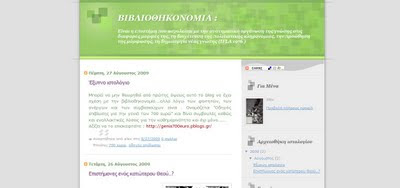
Εδώ και λίγες μέρες ένα νέο βιβλιοθηκονομικό ιστολόγιο προστέθηκε στην ελληνική blog-όσφαιρα, στη διεύθυνση http://vivliothikonomiaepistimi.blogspot.com και το όνομα αυτού Βιβλιοθηκονομία
Ευχόμαστε καλή και δημιουργική συνέχεια

 Στις μέρες μας οι βιβλιοθήκες αναζητούν νέους τρόπους επικοινωνίας με τους χρήστες. Τα podcasts δίνουν τη δυνατότητα στις βιβλιοθήκες να «επικοινωνήσουν» άμεσα με τους χρήστες τους, παρέχοντας τους υψηλού επιπέδου υπηρεσίες. Τα podcasts, μια λέξη που προέρχεται από την σύμπτυξη των λέξεων iPod και Broadcast, είναι ηχητικές εκπομπές που μπορούν να αναπαραχθούν από οποιαδήποτε mp3 συσκευή. Ο καθένας μπορεί, εύκολα να δημιουργήσει ένα podcast, έτσι και οι βιβλιοθήκες έχουν αρχίσει να χρησιμοποιούν τεχνολογίες προσιτές στους νέους (ηλικιακά) χρήστες, αναπτύσσοντας νέους δίαυλους επικοινωνίας. Παρόλο που αποτελούν το νεότερο εργαλείο των λεγόμενων «social softwares», έχουν ήδη συμβάλει στην ανάδειξη των παρεχόμενων αλλά και νέων υπηρεσιών των βιβλιοθηκών.
Στις μέρες μας οι βιβλιοθήκες αναζητούν νέους τρόπους επικοινωνίας με τους χρήστες. Τα podcasts δίνουν τη δυνατότητα στις βιβλιοθήκες να «επικοινωνήσουν» άμεσα με τους χρήστες τους, παρέχοντας τους υψηλού επιπέδου υπηρεσίες. Τα podcasts, μια λέξη που προέρχεται από την σύμπτυξη των λέξεων iPod και Broadcast, είναι ηχητικές εκπομπές που μπορούν να αναπαραχθούν από οποιαδήποτε mp3 συσκευή. Ο καθένας μπορεί, εύκολα να δημιουργήσει ένα podcast, έτσι και οι βιβλιοθήκες έχουν αρχίσει να χρησιμοποιούν τεχνολογίες προσιτές στους νέους (ηλικιακά) χρήστες, αναπτύσσοντας νέους δίαυλους επικοινωνίας. Παρόλο που αποτελούν το νεότερο εργαλείο των λεγόμενων «social softwares», έχουν ήδη συμβάλει στην ανάδειξη των παρεχόμενων αλλά και νέων υπηρεσιών των βιβλιοθηκών. 

